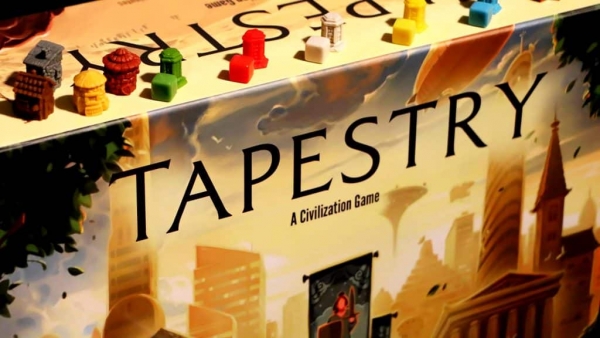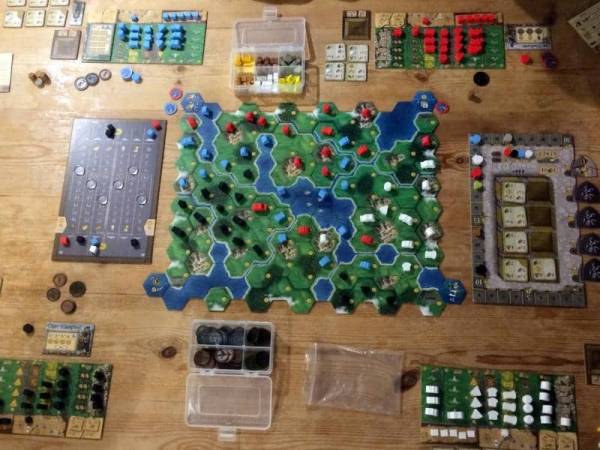The concepts of replayability and variety are often considered to be one and the same. I have previously looked at whether replayability and variety are linked. My article "Variable replayability" came to the conclusion that those two concepts are not necessarily related. A game can offer a lot of variety, but little replayability and vice versa, a game can be very replayable without much variety. However, in this article, I want to look at whether variety should be important to players or whether we should focus more on replayability.
Let's start with some basics. I think we can all agree that how many times a game can be played while still being enjoyable is important. Even legacy games that, by definition, can only be played once, are often sold with recharge packs or offer other ways to reset them. Additionally, even though many of us play a game only once or twice and our shelf of opportunity of unplayed games grows all the time, I think we all want games that are replayable and don't become samey after a couple of plays.
For players, the main driver is probably that games aren't a cheap commodity. People understandably want to see a reasonable return on investment from their spending. They want to be able to enjoy playing the same game multiple times to make it worth it. As a result, publishers and game designers want to make games that can be enjoyed many times.
Replayability and Variety
Next, let's look at whether replayability should be achieved through variety. A game that offers a random setup, hundreds of cards, modular boards or creates variety by other means can be hugely replayable. I know, that's not necessarily the case, but for the purpose of this article, let's assume it is.
The main problem I see with variety is that it makes it harder for people to actually get better at playing the game. Using the same strategy for a highly variable game will most likely lead to very different outcomes every time. You can't try different things and slowly refine your approach over time. You can't compare games to each other. The more randomness there is, the harder it will be to work out which of your decisions made things better and which ones made them worse.
Let's use Tapestry as an example. So you won the first game by a huge margin. You played a specific civilization really well in game one and are elated. However, in the next game, you get a different civilization. Playing the game, in the same way, will probably not work. Sure, you could argue that you have to use a different strategy depending on the civilization you're playing. The problem is, even that won't work. Depending on what civilizations other players have, your strategy will be better or worse. Additionally, how well you play will depend on what tech and tapestry cards come out and in what order. The game is much more about tactics.
 A close-up of the Tapestry game box with some plastic components on top (Photo courtesy of Stonemaier Games)
A close-up of the Tapestry game box with some plastic components on top (Photo courtesy of Stonemaier Games)
Strategy and Tactics
If, on the other hand, you play a game where the setup is always the same and there is no randomness, the match will be decided by the better player. Chess is a classic example of this. The only difference between games will be whether you play white or black. That's much more akin to playing a different faction in other games, but other than that, you can plan out every move in advance. You can take turns in your head and work out what the opponent's best move is and then decide how you would respond to that and so on.
The more you play chess, the better you will get at it. You will learn what worked and what didn't. You will even develop a sort of gut feeling for the game. There will be times in a game when you take turns without really thinking about it. You won't need to work out every move and counter move. The right decision will feel right. Strategies will emerge and you will learn them, because you won't have to deal with randomness.
Of course, games like chess will have certain standard openings. I mean, chess has books full of all the different possible openings with full analyses of their effectiveness and the resulting strength for the white or black player. Memorizing these openings is something that most chess players will have done. It means that the first few turns can be lightning-fast and that can feel a bit boring.
Random Excitement
I think that's why games with a lot of variety or randomness can feel a lot more exciting. Rather than playing from a list of pre-defined, well-known and much-explored standard openings, your first turn will be different every time you play. Playing a game that requires tactics more than strategy can seem a lot more enjoyable. It's the unexpected outcomes of card draws or dice rolls that can create moments of high emotion. Not knowing what card is on top of the draw deck can lead to suspense and the sudden release of this tension can lead to laughter.
Yet, I would argue that games like chess also have these times of tension and suspense. Watching two grandmasters play is mesmerizing. It's the end game where it all happens and comes to a head. Every decision will become excruciatingly difficult for players. You can see it on their faces, even if they try to hide their emotions. Watching top players get out of seemingly hopeless situations and fight for another round is amazing. So, even a game of chess can create a lot of emotions, for players and spectators alike.
Personally, I prefer when players' wits are pitted against each other. I'm not saying I despise all randomness in games, but it has to be limited. A variable setup can make things more interesting, as long as the rest of the game is much more predictable. At the same time, I really don't like when a game is won on a dice roll. Being able to have the challenge of playing factions with different powers is exciting, as long as the game allows you to explore each one and actually get better at playing them.
 Custom wooden token and metal coins from Clans of Caledonia
Custom wooden token and metal coins from Clans of Caledonia
Replayability without Variety
I think that's why I like games such as Clans of Caledonia or Scythe. There is a bit of randomness at the beginning, but after that, it's player against player. You get a chance to learn each faction and explore its strengths and weaknesses. You can see how they perform against each other and adapt your strategy accordingly.
Scythe does have a limited amount of randomness during the game, in the form of encounters and battle cards, but it's not too bad. Mind you, some factions heavily rely on having a good first encounter or they will struggle hugely. Yet, once you know that, it's fine.
Now, don't get me wrong. I do also love playing games with randomness. It's these games I probably have the biggest chance of winning against my games group. They are a lot of fun and some of the most memorable moments were made when I played a game with lots of luck. However, my brain loves it when it has to do all the work and can't rely on the right card being drawn or the wrong dice being rolled.
What About You?
As always, I wonder what you think. Do you like games with randomness or do you prefer games with none or at least only very little? What are your favourite games and how much randomness do they contain? Do you enjoy playing games repeatedly so you can get better at them? Or do you just want to play games and have fun and don't care about improving? Please share your thoughts in the comments below. I'd love to hear from you.
 Games
Games How to resolve AdBlock issue?
How to resolve AdBlock issue? 

















